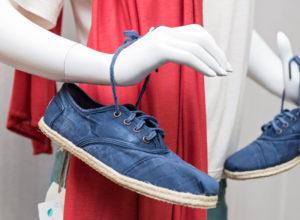
The U.S. textile industry’s leading trade association says President Trump is shooting American textile companies in the foot if it goes ahead with a proposed tariff on Mexico.
Most of the textiles Mexico exports to the U.S. use U.S. yarn and fabric that American textile plants export to Mexico, says the National Council of Textile Organizations.
A resurgent U.S. textile industry of the 21st Century is capital-intensive and makes high-tech fibers exported to re-manufacturers.
One such plant, owned by Lenzing Fiber Inc., in Axis, Alabama, was an early example of how dependent such investments are on trade stability. The Austrian-based company, a world leader in high-tech cellulose fibers, was on the verge of investing $293 million in its Alabama plant when, in late 2018, it indefinitely postponed the plunge, citing “the rising likelihood of increasing trade tariffs.” Instead, the company chose to “readjust” its growth plan by investing in a plant in Thailand. It would have been one of the largest expanding industry investments in Alabama in 2019.
Trump has proposed a 5 percent tariff on Mexican goods, including textiles, as a punishment for what he sees as Mexico’s failure to prevent illegal immigration into the U.S. The proposed increase would begin on June 10 and incrementally increase to 25 percent, if the dispute is not resolved.
“The magnitude of the trading relationship with Mexico is significant for the U.S. textile industry, representing $12.2 billion in two-way textile and apparel trade in 2018,” said Kim Glas, President & CEO of the National Council of Textile Organizations. “The U.S. textile industry alone exported $4.7 billion in yarn and fabrics to Mexico last year and had a net export surplus of $3.8 billion.”
Mexico is the single largest market for U.S.-made textile exports, said Glas.
“We are very concerned about the impact these proposed tariffs would have on a critical and integrated supply chain for the U.S. and Mexico textile and apparel industries,” Glas said. “Under the NAFTA agreement, the U.S. has benefited as a result of strong rules of origin that require the use of regional yarns and fabrics. As a result, the U.S. industry has made significant investment—$22.8 billion from 2006 to 2017—to help grow the manufacturing of fiber, yarns, and fabrics in the United States. NCTO supports the passage of the pending U.S.-Mexico-Canada Agreement (USMCA) because it is a critical trade agreement that will strengthen the industry’s supply chain representing approximately $20 billion in three-way trade.
“Adding tariffs to Mexican apparel imports, which largely contain U.S. textile inputs, would significantly disrupt this industry and jeopardize jobs on both sides of the border. And as a result, it will accelerate substantially the immigration issues the administration’s is seeking to address.”
“In addition, this tariff increase would give a significant competitive advantage to China, which already accounts for about 38 percent of apparel and textile imports to the U.S.” Glas added. “In fact, if this increase goes forward it will drive business back to China at a time when the administration is trying to crack down on intellectual property abuses and make systemic trade reforms that have undermined U.S. manufacturing industries for decades. This proposal is extremely concerning to U.S. textile manufacturers and we will do all we can to amplify these concerns with the administration and members of Congress,” Glas said.
Mexico and Canada together are the U.S. textile industry’s two largest export markets worldwide. In 2018, the U.S. ran a combined $3.8 billion surplus in textiles and apparel with those two North American Free Trade Agreement trading partners.



